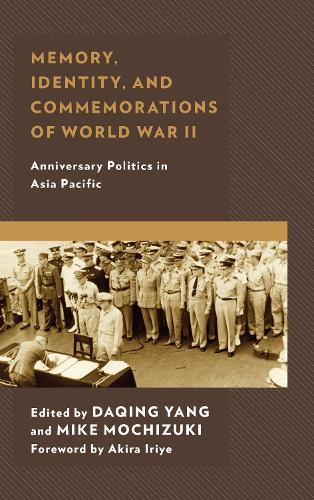
Memory, Identity, and Commemorations of World War II: Anniversary Politics in Asia Pacific
(Paperback)
Available Formats
Publishing Details
Memory, Identity, and Commemorations of World War II: Anniversary Politics in Asia Pacific
By (Author) Daqing Yang
Edited by Mike Mochizuki
Foreword by Akira Iriye
Contributions by Lily Gardner Feldman
Contributions by Marc Gallicchio
Contributions by Ricardo T. Jose
Contributions by Christine Kim
Contributions by Marlene Laruelle
Contributions by Tze Loo
Contributions by Mike Mochizuki
Bloomsbury Publishing PLC
Lexington Books
28th October 2019
United States
Classifications
Professional and Scholarly
Non Fiction
Second World War
Politics and government
940.546
Physical Properties
Paperback
194
Width 151mm, Height 222mm, Spine 15mm
295g
Description
Why do some governments and societies attach great significance to a particular anniversary year whereas others seem less inclined to do so What motivates the orchestration of elaborate commemorative activities in some countries What are they supposed to accomplish, for both domestic and international audience In what ways do commemorations in Asia Pacific fit into the global memory culture of war commemoration In what ways are these commemorations intertwined with current international politics This book presents the first large-scale analysis of how countries in the Asia Pacific and beyond commemorated the seventieth anniversaries of the end of World War II. Consisting of in-depth case studies of China, Taiwan, Korea, Japan, Singapore, the Philippines, United States, Russia, and Germany, this unique collective effort demonstrates how memories of the past as reflected in public commemorations and contemporary politicsboth internal and internationalprofoundly affect each other.
Reviews
This is a powerful, wide-ranging set of essays that provides a genuinely transnational view of the meaning of one turning-point year in modern history: 1945. Bringing together papers on Asia, Europe, and North America, this volume provides a truly innovative contribution to the field of war and memory. -- Rana Mitter, University of Oxford
This is an excellent and timely collection of papers on divergent memories of World War II in the Asia-Pacific region. While Sino-Japanese disputes over islands and the controversies over comfort women make headlines, there is a great diversity of competing historical memories in the region, as this book captures very well. Of particular value is the books comparative focus: it considers not only Northeast and Southeast Asia but also the United Statesa key player in the Asia-Pacific Warand Germany, a historical benchmark for postwar reconciliation. -- Gi-Wook Shin, Stanford University
Every chapter offers numerous insights, and the book makes an important contribution to the growing literature on memory and Asia-Pacific reconciliation. . . . and will remain relevant as long as contested memories of this great conflict shape prospects for reconciliation in the Asia-Pacific region. * Pacific Affairs *
Author Bio
Daqing Yang is associate professor of history and international affairs at George Washington University. Mike Mochizuki is associate professor of political science and international affairs and holds the Japan-U.S. Relations Chair in Memory of Gaston Sigur at George Washington University.
